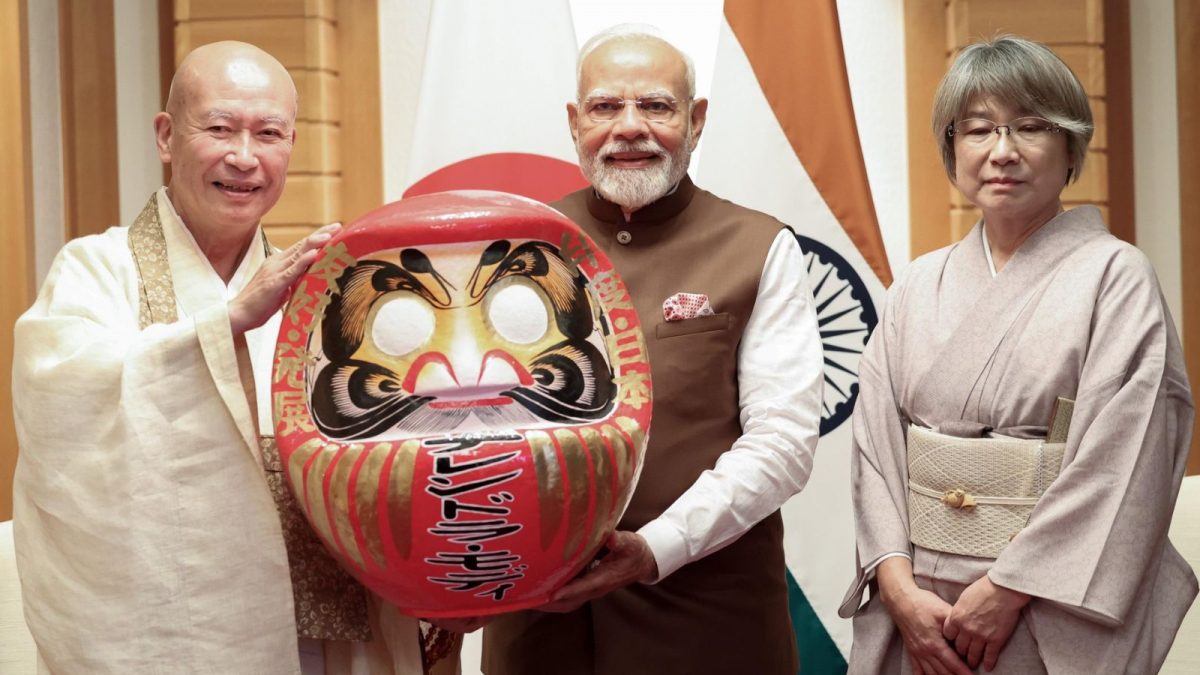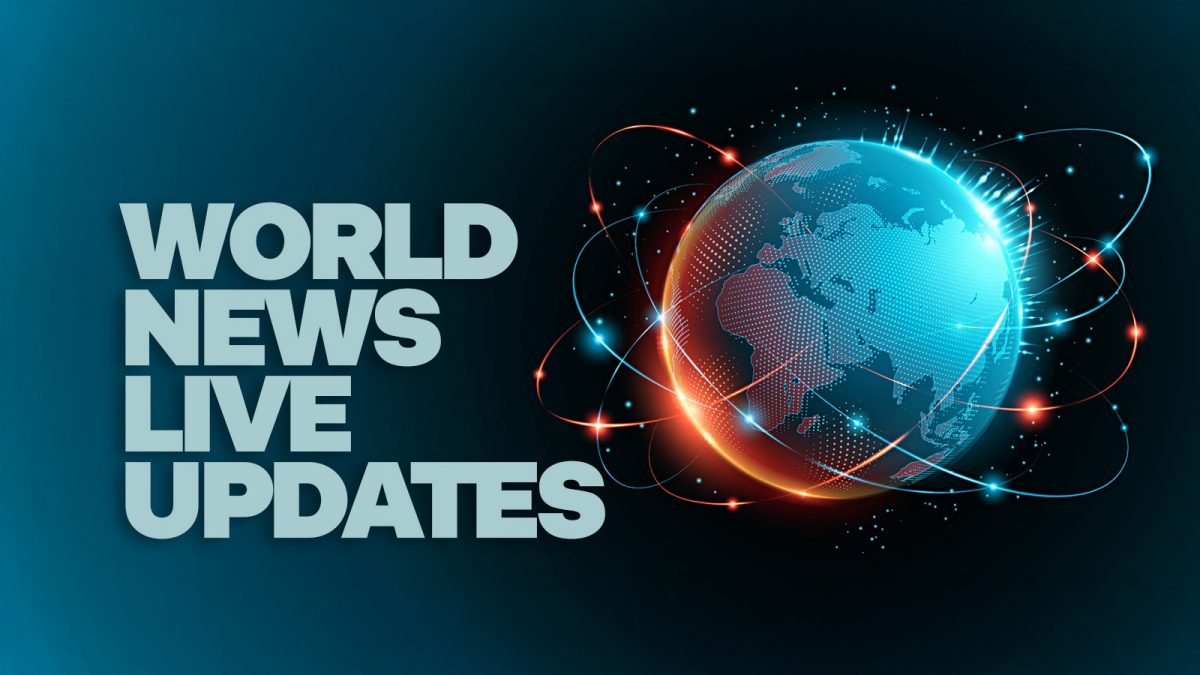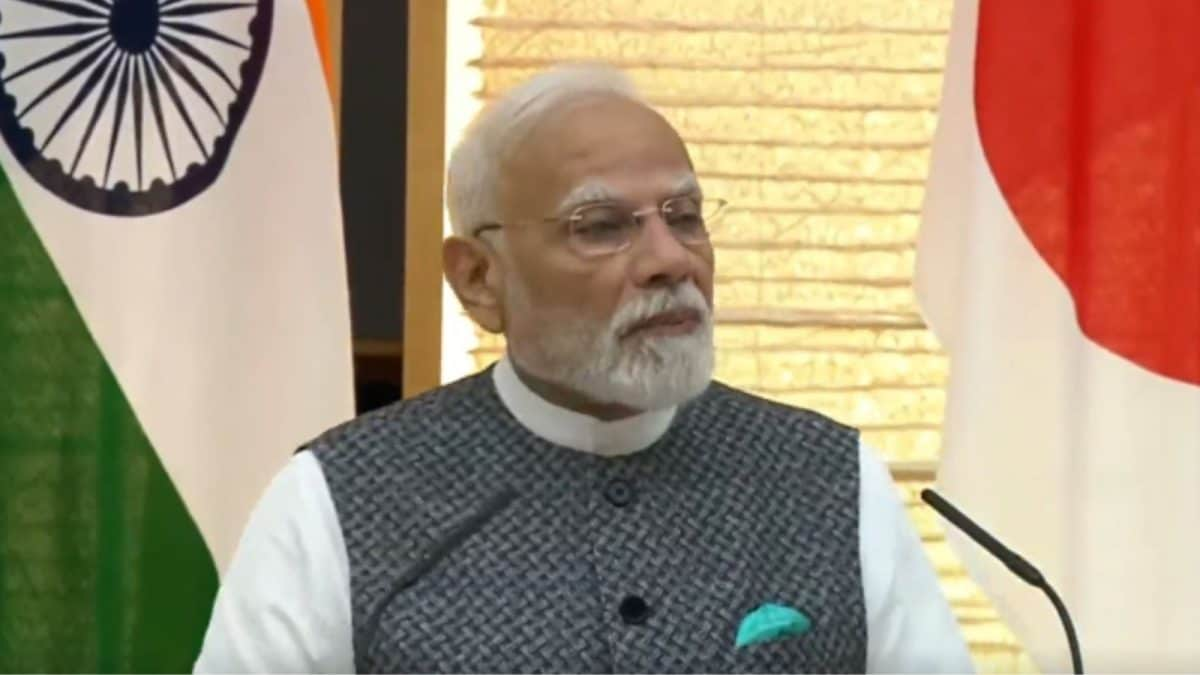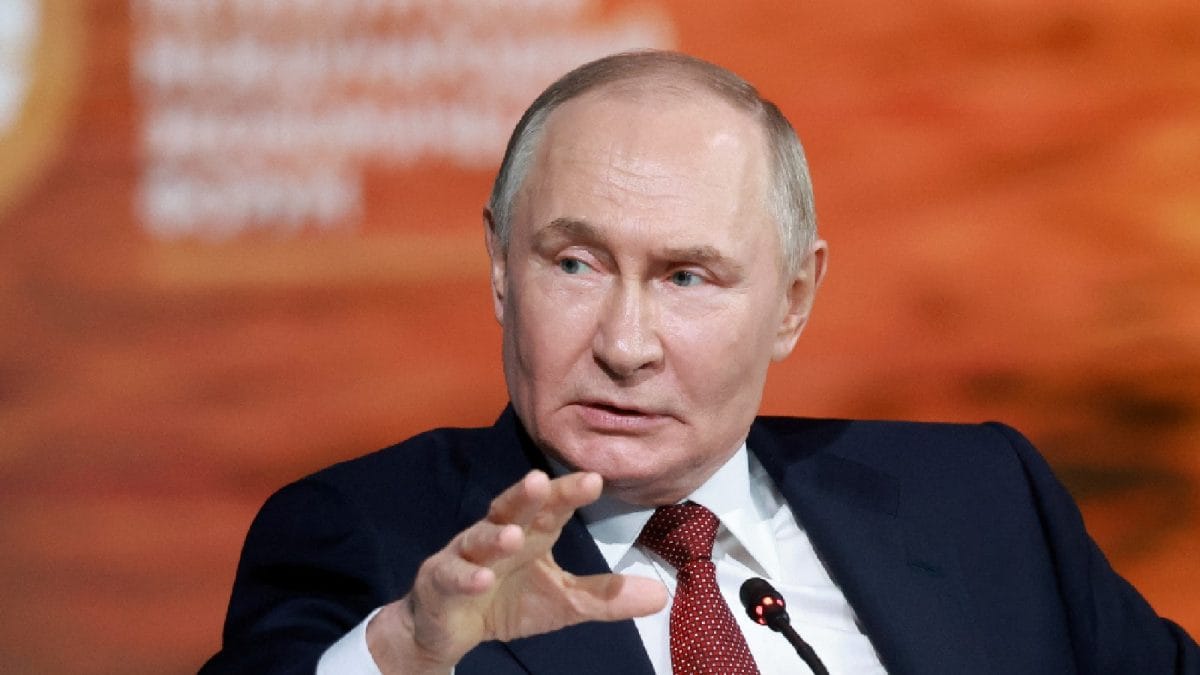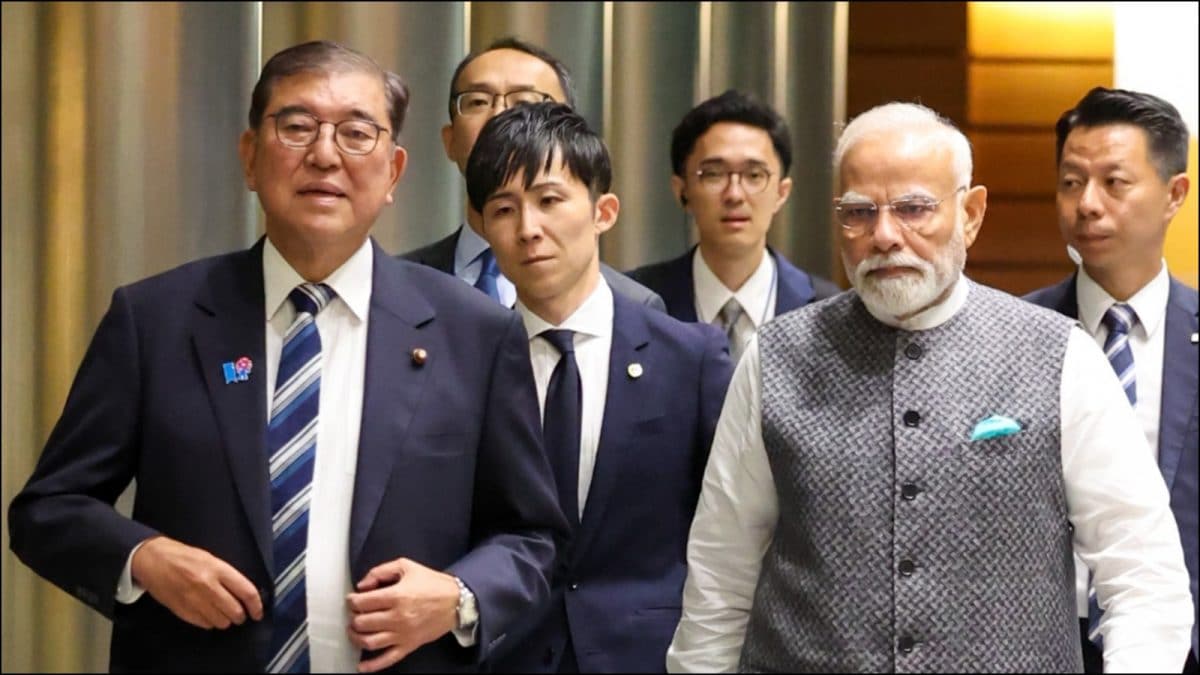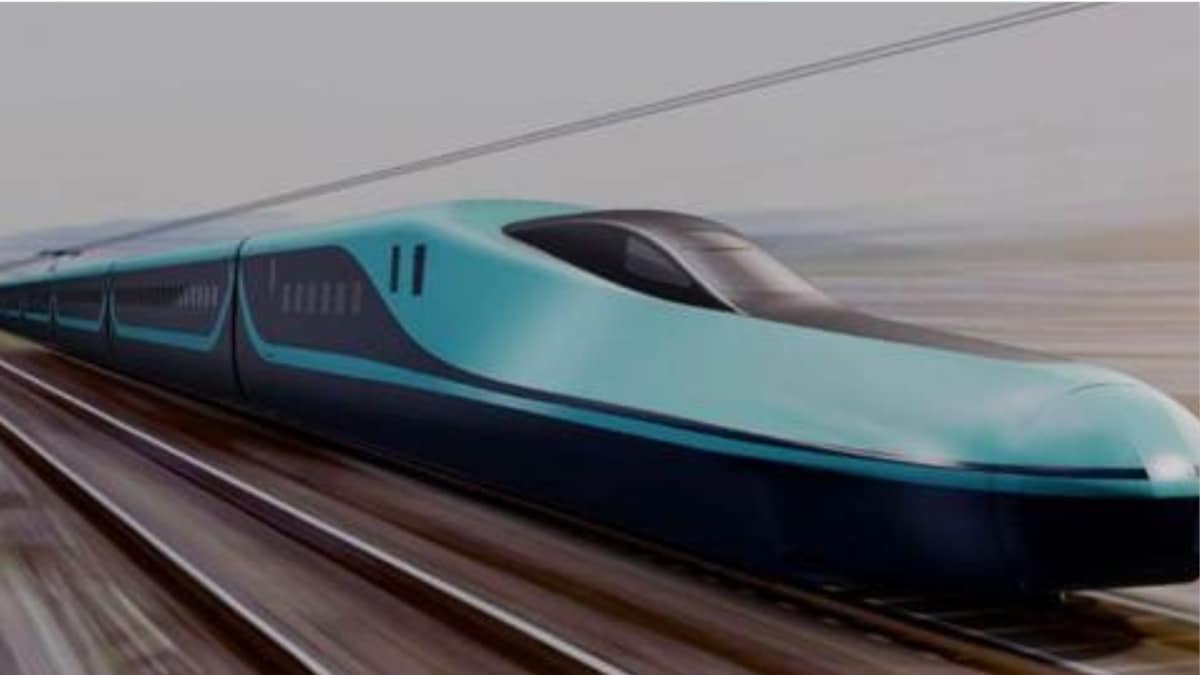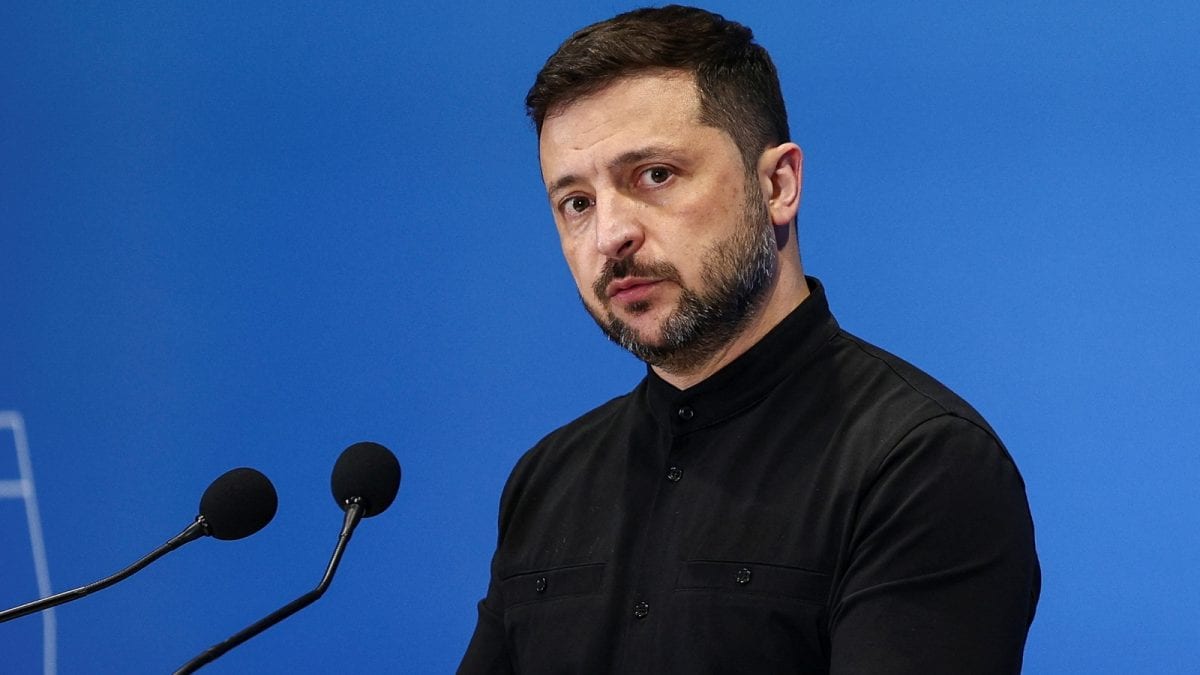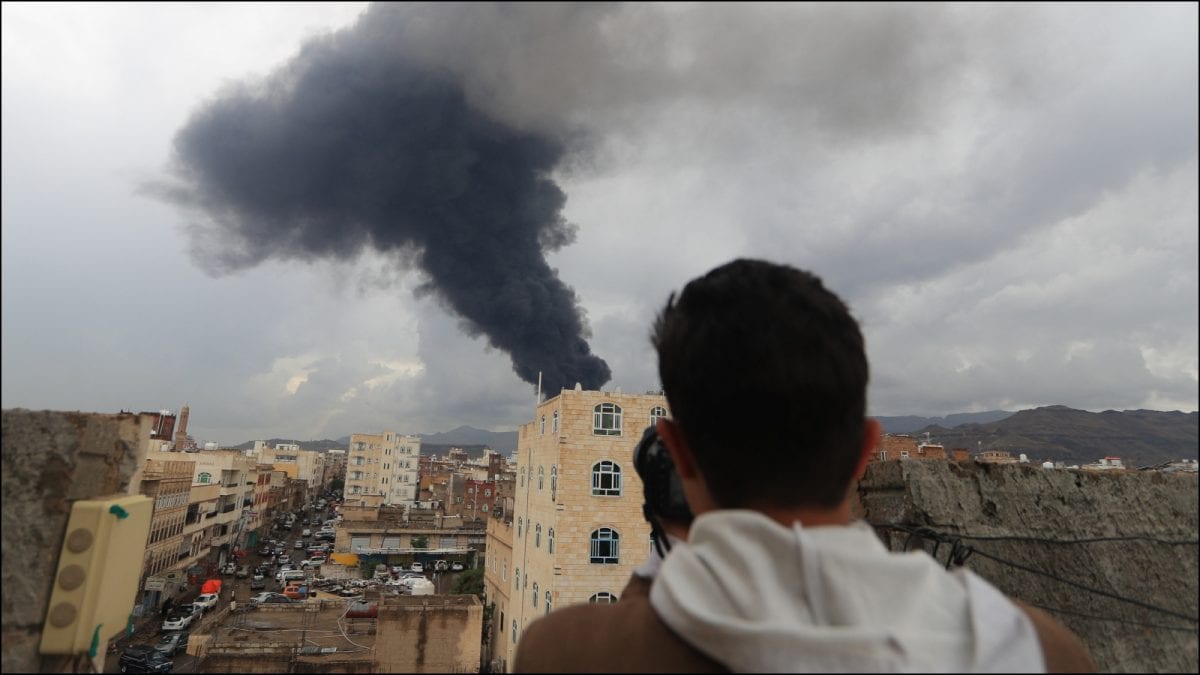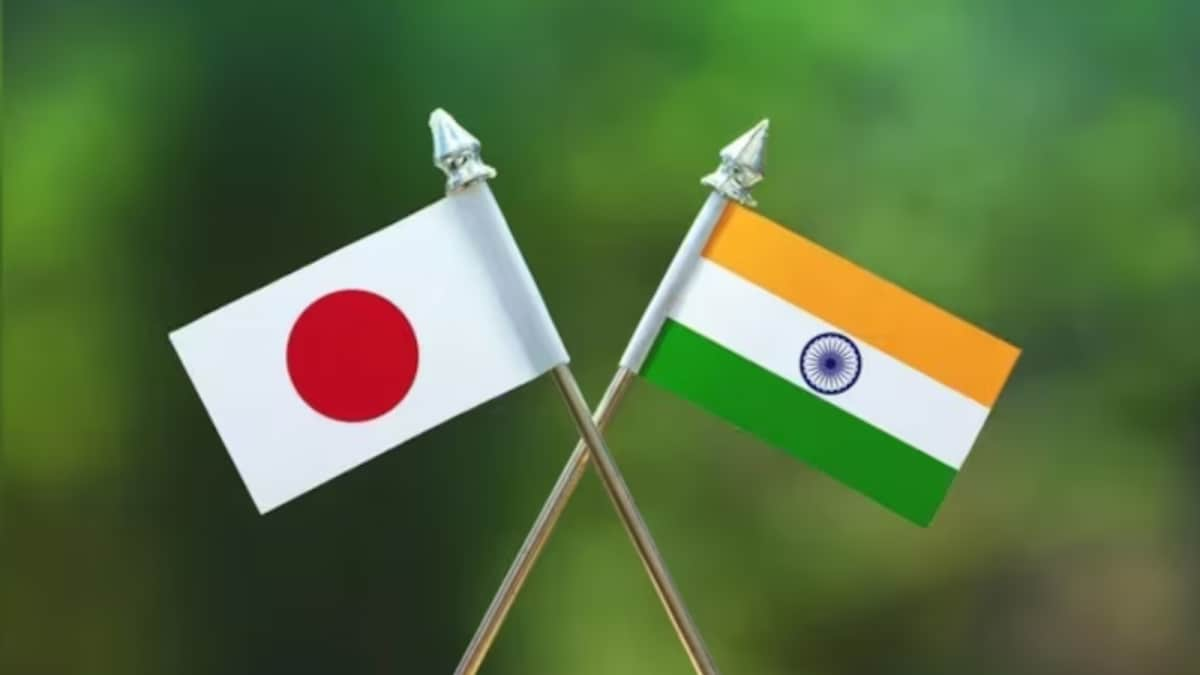Drone incident 'represents alarming sign of spillover of Russia's aggression ... onto Nato territory,' Lithuanian minister says
Lithuania’s foreign minister Kęstutis Budrys said a bit more about the incident on his social media channels:
“Last Monday, a Russian military drone violated Lithuanian airspace. This marks the second such incident in less than a month. Similar airspace violations have also been reported recently by other Allies.
These repeated incidents represent an alarming sign of the spillover of Russia’s aggression against Ukraine onto Nato territory.
We cannot compromise the security of our country and citizens, nor the integrity of Nato airspace. We must remain vigilant, as the threat is real and growing.
Today, with @DSakaliene, we issued a joint letter to @SecGenNATO calling for immediate measures to enhance air defence capabilities in #Lithuania & accelerate the full implementation of the rotational air defence model.
Air defence is vital to Allied security. Securing Nato’s Eastern Flank must remain a top priority for the Alliance.”
Key events 2m ago UN plastic pollution talks must result in ambitious treaty, leading expert says 5m ago Swiss president, economy minister travel to Washington to avert punishing US tariffs 15m ago Trump doubles down on claims he can do 'anything' with EU investment 22m ago Drone incident 'represents alarming sign of spillover of Russia's aggression ... onto Nato territory,' Lithuanian minister says 37m ago 'Disoriented' drone crossing into Lithuania from Belarus was carrying explosives, authorities say 1h ago Zelenskyy speaks to Trump on sanctions against Russia, deal with US on drones in 'productive' phone call 2h ago Zelenskyy thanks Nordic countries for €430m military aid package 2h ago EU's $600bn investment promise is more of an intention, not a 'gift' - snap analysis 3h ago Trump says EU could face 35% tariffs if it fails to meet $600bn investment promises, threatens with pharma tariffs 3h ago 'If energy goes down, Putin is going to stop killing people,' Trump says, as he doubles down on threat to raise tariffs on India for buying Russian oil 4h ago Nato's Rutte welcomes first financial packages to help with deliveries for Ukraine 4h ago Norway, Sweden and Denmark to finance €430m military package for Ukraine 5h ago India rejects US, EU's 'unjustified' criticism for trading with Russia 5h ago EU says 'surprised' by German finance minister's criticism of EU-US trade deal 5h ago EU 'welcomes US pressure' on Russia to end war 'through any means necessary' 6h ago 'Unbearable' situation in Gaza makes EU push for more aid, with 'still lot to be done' 6h ago Ukraine sees Indian components used in Russian drones, senior Zelenskyy aide reveals 6h ago Kremlin decries Trump's 'illegal' threat to raise tariffs on India for Russian oil purchases 6h ago EU 'not celebrating' new 'second best' US tariff regime as details on wines, spirits, cars and pharma emerge 8h ago The Netherlands to buy €500m-worth of US weapons for Ukraine 8h ago Diageo warns of costly impact of US tariffs 8h ago Morning opening: Increase the pressure on Russia, says Ukraine Show key events only Please turn on JavaScript to use this feature
UN plastic pollution talks must result in ambitious treaty, leading expert says

Sandra Laville
Speaking of Geneva:
Delegates at the UN plastic pollution treaty talks in Geneva must secure an ambitious global agreement so they can look future generations in the eye, one of the world’s leading marine litter experts has said.
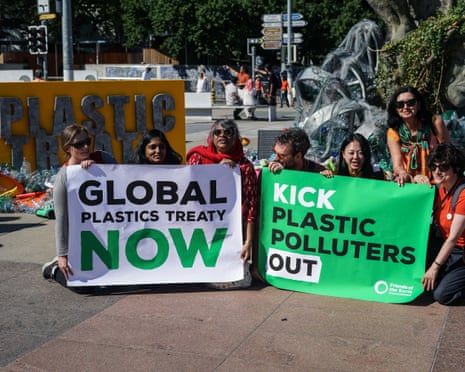
Prof Richard Thompson, who was named one of Time’s 100 most influential people this year for his groundbreaking work on plastic pollution, said decisive action was needed to protect human health and the planet.
He spoke as delegates from more than 170 countries prepared to meet in Geneva to bridge what have become deep divisions over whether limits on plastic production are included in a final treaty.
Since 2022, when the UN first secured an agreement from 173 countries to develop a legally binding treaty to cut plastic pollution, five separate negotiations have failed to secure a final text to sign.
The initial agreement was for a treaty to address the whole life cycle of plastics. But increasing numbers of plastics industry lobbyists have attended each round of talks to push back against production cuts.
Swiss president, economy minister travel to Washington to avert punishing US tariffs

Lisa O’Carroll
The president of Switzerland is travelling to Washington to try and avert a punishing 39% tariff rate on all exports including pharma and luxury watches exported to the US.
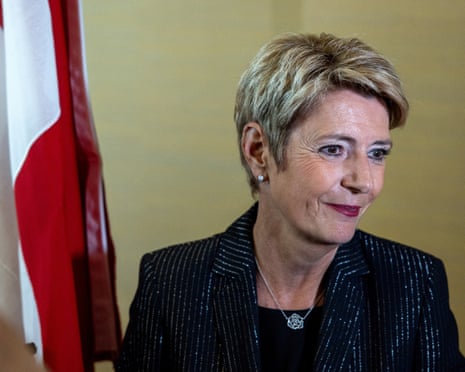
Karin Keller-Sutter and economy minister Guy Parmelin were heading to Washington “to facilitate meetings with the US authorities at short notice and hold talks with a view to improving the tariff situation for Switzerland,” the government said in a statement.
The 39% tariff announced by Trump last Friday blindsided the government and led industry associations to warn of job losses.
The Swiss government noted that the country will be hit by much higher tariffs than what other wealthy economies, such as Britain, Japan or the European Union, are facing.
Switzerland counts the US as its top export market for pharmaceuticals, watches, machinery and chocolates with bilateral trade quadrupling in the past two decades.
But it still has a $48bn trade deficit with the US, something that has irritated Trump to such a degree that he took a personal swipe at Keller-Sutter on Tuesday.
He told CNBC that “the woman was nice but she didn’t want to listen” when they spoke last Thursday.
Trump doubles down on claims he can do 'anything' with EU investment

Lisa O’Carroll
Donald Trump’s White House is doubling down on claims that he can do “anything” he likes with the $600m (£451m) of investments pledged by the EU as part of the tariff deal Brussels struck at his Scottish golf course nine days ago.
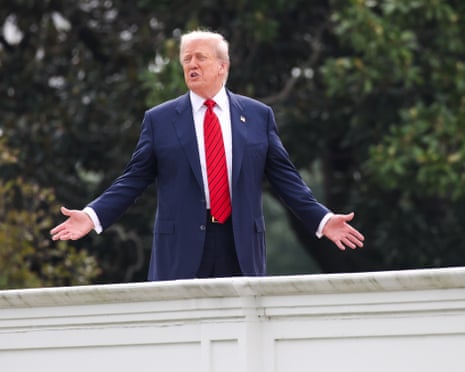
A White House press release hailing the top 10 take outs from Trump’s interview today on CNBC starts with his “historic trade deals”.
“We’re taking in trillions of dollars … If you look, Japan – we’re taking in $550 billion, and ... that’s OUR money. It’s our money to invest as we’d like. European Union – $650 billion... and they’re going to buy $750 billion worth of our energy.”
The investment pledge is not an EU fund for the US, senior EU officials have pointed out. Rather, it is an aggregate of what private EU companies have committed to, or say they will invest, in the next three years.
And for the second historic move, the White House refers to Trump’s pledge to end what he sees as Europe’s price gouging on pharma quoting him saying:
“For 30 years, Europe has had drug prices that are, in many cases, one-tenth the cost of drugs here... We’re not going to pay ten times more for a pill than they pay in Europe, and that’s going to have a tremendous impact.”
Drone incident 'represents alarming sign of spillover of Russia's aggression ... onto Nato territory,' Lithuanian minister says
Lithuania’s foreign minister Kęstutis Budrys said a bit more about the incident on his social media channels:
“Last Monday, a Russian military drone violated Lithuanian airspace. This marks the second such incident in less than a month. Similar airspace violations have also been reported recently by other Allies.
These repeated incidents represent an alarming sign of the spillover of Russia’s aggression against Ukraine onto Nato territory.
We cannot compromise the security of our country and citizens, nor the integrity of Nato airspace. We must remain vigilant, as the threat is real and growing.
Today, with @DSakaliene, we issued a joint letter to @SecGenNATO calling for immediate measures to enhance air defence capabilities in #Lithuania & accelerate the full implementation of the rotational air defence model.
Air defence is vital to Allied security. Securing Nato’s Eastern Flank must remain a top priority for the Alliance.”
'Disoriented' drone crossing into Lithuania from Belarus was carrying explosives, authorities say
We’re getting big news from Lithuania with the country’s prosecutor general confirming that an unmanned drone that crossed into the country from Belarus last week and crashed near a military training ground was carrying explosives.
The drone was originally reported by local residents concerned by the sight and the noise the object was making when flying near Lithuania’s capital, Vilnius. It took authorites four days before they eventually located it on the ground near the Gaižiūnai military training base.
Prosecutor general Nida Grunskienė said today that it was established that the drone was carrying an explosive device, which was “neutralised at the scene,” Lithuania’s public broadcaster LRT reported. Various parts of the aircraft are now undergoing more in-depth forensic examination, she said.
Col Dainius Paškevičius, chief of staff of the Lithuanian Air Force, noted the drone carried only “about two kilograms of explosives,” way less than a typical load of 50 kg, LRT noted.
Lithuania’s defence minister Dovilė Šakalienė said the current assumption was that the drone entered Lithuania by accident after being disoriented by the Ukrainian defence systems, but this will remain a part of the investigation.
Both Šakalienė and the country’s foreign minister Kęstutis Budrys also said that Lithuania had notified Nato of the initial findings and requested urgent additional air defence support to protect the Lithuanian sky from similar incidents.
Zelenskyy speaks to Trump on sanctions against Russia, deal with US on drones in 'productive' phone call
Ukrainian president Volodymyr Zelenskyy has said he had a “productive conversation” with US president Donald Trump this afternoon, discussing how to end the war with Russia.
Repeatedly thanking Trump for his support, Zelenskyy said it was “really necessary to stop the killings as soon as possible,” adding this could have already happened “if Russians had not dragged it out.”
The Ukrainian president said the leaders noted that “the Russians have increased the severity of the strikes,” and said that Trump was "fully informed” about the situation.
“Of course, we talked about sanctions against Russia. Their economy continues to fall, and that is why Moscow is so attentive to this prospect and President Trump’s determination. This can change a lot,” he said.
Zelenskyy also said they briefly discussed the European aid packages for Ukraine confirmed by the Netherlands last night and the three Nordic countries today, adding that “this interaction with Nato will continue.”
He also said that Ukraine has prepared a draft agreement on drones with the US, and was ready “to discuss in detail and conclude it.”
Zelenskyy thanks Nordic countries for €430m military aid package
Back to Ukraine, the country’s president Volodymyr Zelenskyy has welcomed the €430m military aid package put together by Denmark, Norway and Sweden (13:57), saying it will “significantly boost our ability to protect lives.”
“These steps are a new, real foundation for long-term security across all of Europe. Russia will never turn Europe into a continent of war, and it is precisely through our joint efforts that we are ensuring peace will prevail,” he said.
EU's $600bn investment promise is more of an intention, not a 'gift' - snap analysis

Lisa O’Carroll
The EU’s promise to invest $600bn in the US as part of its tariff deal is just that. It is an “intention” and not a “gift” as decribed by Donald Trump (14:56), senior officials have said.
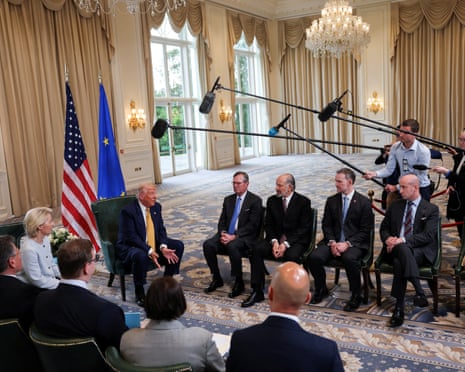
Trump’s characterisation of the money is the type of clash Brussels is desperate to avoid, given the US president’s history of making declarations he does not deliver on.
The day after the EU-US tariff deal was struck at Donald Trump’s Scottish golf resort, officials explained very clearly that the promise of investments was an “aggregate” of money promised by EU companies, including major car manufacturers in Germany and pharma companies, many of which are based in Ireland, the target of much of Trump’s ire when it comes to medicines.
A senior official in the EU insisted last week that $600bn did not “come out of thin air” but was the result of detailed conversations with trade associations and big EU companies about their investment plans in the US.
The EU itself has no power to invest money itself in the US.
“We have basically aggregated what we know about investment intentions of companies, of private companies,” said one senior source who added that that this would be expressed in the joint statement as “an intention”.
This is at odds with Trump’s description of it as a fund that he can personally direct.
“The details are, $600bn to invest in anything I want, anything. I can do anything I want with it. And the purpose was, they’ve been, you know, ripping us to so many years that it’s time that they pay up and they have to pay up,” he said earlier today.
But it is also at odds with the White House statement on 28 July, the day after the EU-US deal was struck.
It describes the $600m as “new investments” that will be made “by 2028”.
Under the title “Massive EU Investment in the United States”, the White House repeats the point saying: “The EU will invest $600 billion in the United States over the course of President Trump’s term.”

Jakub Krupa
You won’t be surprised to hear that the $600bn investment promised by the EU is a tiny bit more complicated than “a gift” that Trump can do anything he wants with it (14:56).
It mostly covers existing and future commitments already made by EU companies – and not represent a blank cheque for Trump to do anything he wants with it.
We will bring you more on this shortly.
Trump also bragged in passing that leaders of Nato “do whatever I want.”
Erm.
Trump says EU could face 35% tariffs if it fails to meet $600bn investment promises, threatens with pharma tariffs
US president Donald Trump also said that if the EU fails to meet its investment promises under the EU-US deal, the bloc will face tariffs of 35%.
He said:
“They bought down their tariffs. They paid $600bn and because of that I reduced their tariffs from thirty percent down to fifteen percent, and a couple of countries came, ‘How come, the EU is paying less than us’, and I said well, because they gave me $600bn.
And that’s a gift, that’s not like, you know, a loan … they gave us $600bn that we can invest in anything we want.”
He added:
“The details are, $600bn to invest in anything I want, anything. I can do anything I want with it.
And the purpose was, they’ve been, you know ripping us to so many years that it’s time that they pay up and they have to pay up.”
He then criticised the Swiss “prime minister” – it was the country’s federal president – saying she “didn’t want to listen” to his arguments.
Trump then moved on to pharmaceuticals, saying “they make a fortune with pharmaceuticals, and they make in China and Ireland and everything else,” and that he will be announcing separate tariffs on them “within the next week or so.”
“This is a, you know, this is a separate class than the 15% tariffs on sort of everything. These are excluded classes, I like to call them, like steel, aluminium.”
He added:
“We’ll be putting an initially small tariff on pharmaceuticals, but in one year, one and a half years maximum, it’s going to go to 150%, and then it’s going to go to 250%, because we want pharmaceuticals made in our country.”

Jakub Krupa
There are many more lines of interest in this Trump interview, as he also spoke about the EU-US trade deal. Let me get them for you now.
'If energy goes down, Putin is going to stop killing people,' Trump says, as he doubles down on threat to raise tariffs on India for buying Russian oil
US president Donald Trump has been talking to CNBC’s Squawk Box in the last few minutes, and he suggested that a further drop in energy prices could make Russian president Vladimir Putin halt the Russian invasion of Ukraine and “stop killing people.”
If energy goes down enough, Putin is going to stop killing people.
He explained:
“If you get energy down, another $10 a barrel, he’s going to have no choice because his economy stinks.”
Trump also repeated his threat he would increase US tariffs on India soon over their continuing purchase of Russian oil.
“They have the highest tariff of anybody ... We settled on 25%, but I think I’m going to raise that very substantially over the next 24 hours because they’re buying Russian oil, they’re fueling the war machine, and if they going to do that, I’m not going to be happy.”
Nato's Rutte welcomes first financial packages to help with deliveries for Ukraine
Nato secretary general Mark Rutte has just responded to the Nordic package of help for Ukraine, saying:
“Grateful to Denmark, Norway & Sweden for fast action to fund a package of US military support for Ukraine. This will deliver life-saving equipment & critical supplies to the front-line, strengthening Ukraine’s hand & helping them deter aggression as they pursue lasting peace.”
He also earlier thanked the Netherlands for its contribution, saying:
“Great to see the Netherlands taking the lead and funding the first package of US military equipment for Ukraine under NATO’s Prioritised Ukraine Requirements List initiative. I thank Allies for getting Ukraine the equipment it urgently needs to defend against Russian aggression. I expect further significant announcements from other Allies soon.”
Norway, Sweden and Denmark to finance €430m military package for Ukraine
Norway, Sweden and Denmark have just announced plans to jointly finance a support package for Ukraine under the new US-Nato mechanism, Prioritised Ukraine Requirement List, agreed with US president Donald Trump last month.
The package, estimated to be worth some €430m in total, will include support for “Ukraine’s air defence, ammunition and other essential equipment,” Norwegian government’s press release said. The details of the package will not be made public for security reasons.
Sweden will make the largest contribution of over €230m, with Norway to follow at around €120m and Denmark at around €80m, according to indicated totals.
Norwegian defence minister Tore O. Sandvik said the new package was meant to ensure that Ukraine “quickly receives the equipment it needs” to defend itself from Russia.
Simultaneously, Swedish ministers presented the outline of the deal at a press conference in Stockholm.
In her opening statement, deputy prime minister and energy, industry minister Ebba Busch insisted “Ukraine’s cause is our cause,” as she stressed the need to continue supporting Ukraine amid sustained Russian attacks.
Defence minister Pål Jonson added that the continued strikes showed there was little appetite from Russia to end the conflict.
This is a second package of this kind after the Netherlands announced its plans to spend around €500m on US weapons for Ukraine under the new scheme (10:15).
India rejects US, EU's 'unjustified' criticism for trading with Russia
Meanwhile, India has responded to criticism from the US and the EU, saying it is being unfairly singled out by them over its Russian oil purchases when they both trade extensively with Moscow despite the war in Ukraine, Reuters reported.
In a rare show of unity, prime minister Narendra Modi’s Bharatiya Janata Party (BJP) and the main opposition Congress condemned Trump’s repeated criticism of New Delhi.
India’s foreign ministry said in a statement issued late on Monday that “it is revealing that the very nations criticising India are themselves indulging in trade with Russia“.
“It is unjustified to single out India,” the ministry said. It said the EU conducted €67.5bn euros ($78.02bn) in trade with Russia in 2024, including record imports of liquefied natural gas (LNG) reaching 16.5 million metric tons.
The United States, the statement said, continues to import Russian uranium hexafluoride for use in its nuclear power industry, palladium, fertilisers and chemicals. It did not give a source for the export information.
EU says 'surprised' by German finance minister's criticism of EU-US trade deal
Oh-oh.
The EU has just publicly clashed with Germany over finance minister Lars Klingbeil’s comments on EU-US trade in Washington last night.
Klingbeil said the EU was “too weak” in negotiations, and argued that “we can’t be satisfied with the result that was achieved,” suggesting he would push for limited exemptions for Germany’s steel sector, as reported by Deutsche Welle.
But EU trade spokesperson, Olof Gill, pointedly said the bloc was “quite surprised” to hear his comments.
He said:
“I would remind you that EU, member states and business stakeholders have consistently underscored that a trade conflict with the US was not a desirable course of action. They have insisted to us that only a negotiated solution could ensure stability and protect our shared interests.
This was the view of an overwhelming majority of EU member states, including the one from which the minister you mentioned hails.”
Gill said the EU “reached a negotiated solution to avoid a lose-lose tariff escalation, that’s what our member states asked for, … that’s what we have delivered.”
“So … it is most surprising to us to hear that a minister from the member state in question has expressed that view, given that nothing has happened here in terms of the Commission’s approach, negotiation or outcome achieved without the clear signal received from our member states.”
He also said that more work on steel is being done at the EU level.
Deputy chief spokesperson Arianna Podestà went further saying that Klingbeil’s comments “do not correspond to the conversations we have had with the same member state over the past weeks and months.”

 3 weeks ago
3 weeks ago
